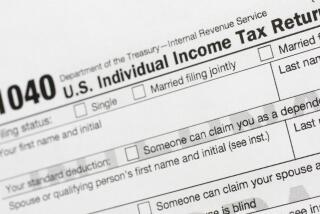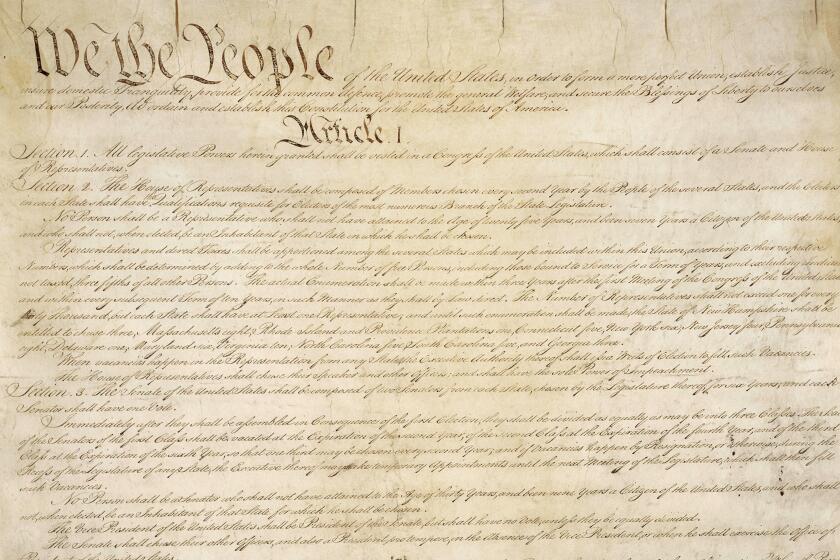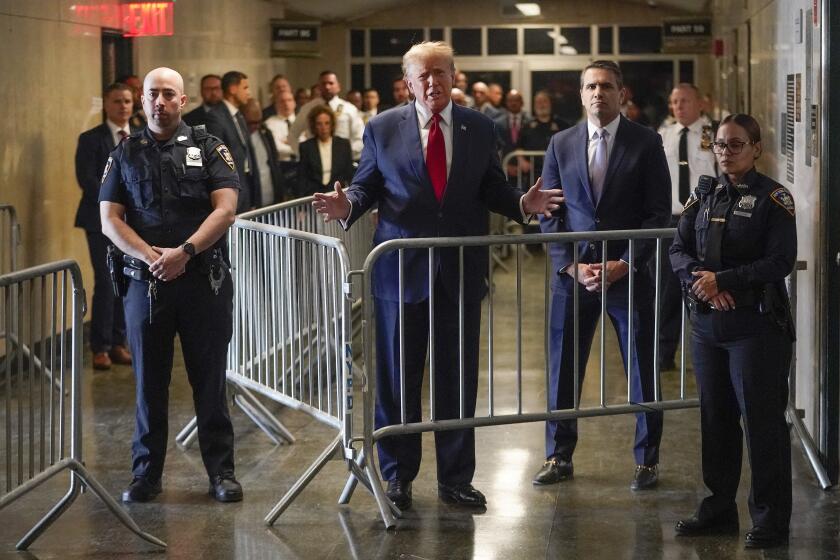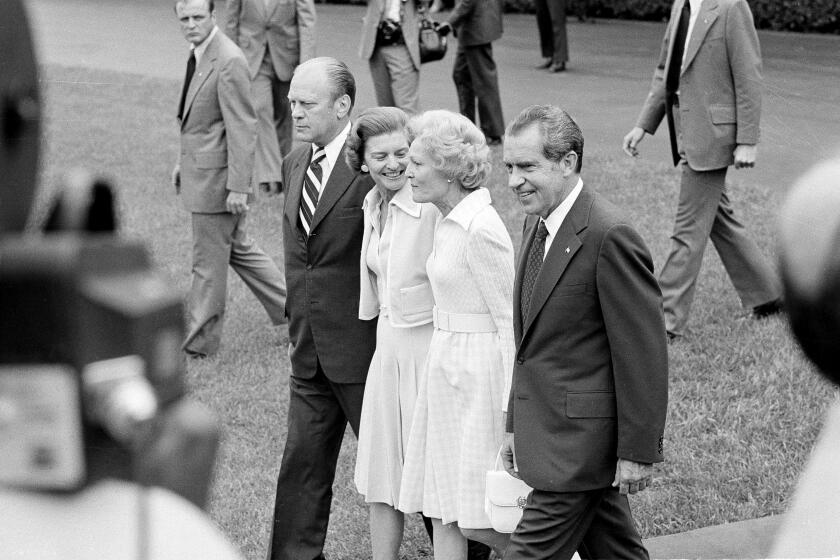Column: If Trump wants to run the country like a business, he should expand the IRS
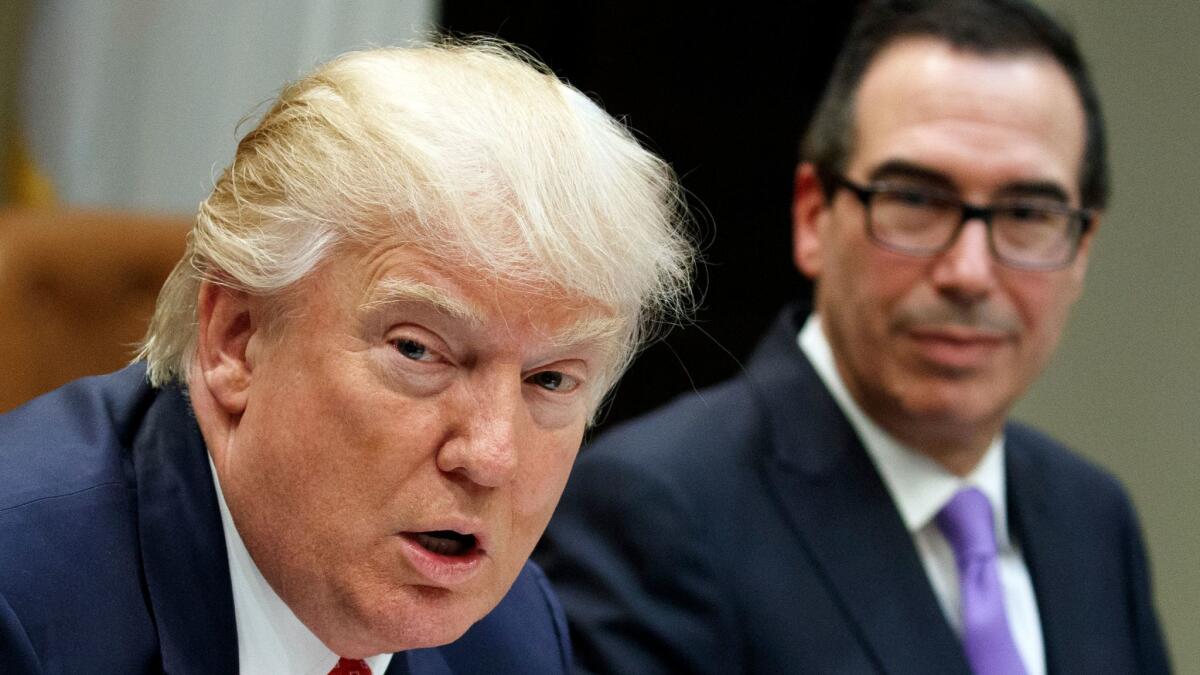
If you’re still laboring over your tax forms to meet the April 18 filing deadline, here’s a comforting thought: Unless you made well over $1 million — and unless your financial life is as complicated as, say, Donald Trump’s — your chances of being audited are getting ever closer to zero.
The Internal Revenue Service says it will process 152 million individual tax returns this year; only about a million returns will trigger an audit. That’s roughly two-thirds of 1%, the lowest rate in more than a decade.
There’s a simple reason for that decline: Since 2010, Congress has reduced the tax agency’s budget by roughly 17% in real dollars. Spending on tax enforcement, including audits, has been cut even more deeply — almost 30%.
As a result, the federal government is losing at least $7 billion in revenue each year, according to tax expert William G. Gale of the Brookings Institution.
A smart businessman would look at those numbers and say: That’s nuts.
[E]very additional dollar spent on tax enforcement will produce at least $6 in revenue. That’s a return on investment any businessman would love.
That’s what Steven Mnuchin, the Los Angeles banker who became Trump’s treasury secretary, concluded when he took his first look at the IRS.
“I was particularly surprised … that the IRS headcount has gone down quite dramatically,” Mnuchin told senators at his confirmation hearing. “Especially for an agency that collects revenues, this is something that I’m concerned about.”
A stronger IRS, Mnuchin said, could reduce the federal budget deficit by closing the “tax gap,” the more than $450 billion difference between what the federal government is owed and what it actually collects.
“This is one of the areas where I think we will all agree: to the extent we add resources, we can collect more money,” he said.
And he was sure the president, another hardheaded businessman, would agree. “We add people and we make money — he’ll get that completely. That’s a very quick conversation with Donald Trump.”
That was before Mnuchin collided with Mick Mulvaney, Trump’s new budget director.
Mulvaney, a former member of Congress, was a leader of the House Freedom Caucus, many of whose members say they’d like to abolish the IRS entirely. Mulvaney and his colleagues have been working to cut the IRS budget for years.
A few weeks after Mnuchin’s testimony, Mulvaney released Trump’s first-draft budget proposal. It proposed cutting $239 million from the IRS.
Mulvaney hasn’t explained why he chose that number; most of the media attention went to programs that were being slashed even more deeply, including the State Department and social services.
But he gave a clue to his thinking last year, when he co-sponsored a bill to impeach IRS Commissioner John Koskinen, ostensibly for failing to cooperate with congressional investigations.
“Who’s going to come rushing to the defense of the IRS?” Mulvaney said then.
It would be hard to find a clearer collision between the two cultures of the Trump administration: the pragmatists like Mnuchin, many of them former Democrats, who came to Washington to run the federal government more like a business — and conservative hard-liners like Mulvaney, who want to shrink the federal government more than they want to run it.
If Trump is thinking clearly about the wrenching changes he’s seeking in the federal budget — large-scale tax cuts, domestic spending cuts, and a big increase in defense spending — he’ll listen to Mnuchin’s argument about revenue.
The IRS and outside experts estimate that every additional dollar spent on tax enforcement will produce at least $6 in revenue. That’s a return on investment any businessman would love.
There’s another reason Trump should want to spend more money on tax enforcement: civic virtue.
“Americans see taxpaying … as a civic duty and a moral obligation,” argues political scientist Vanessa Williamson, author of “Read My Lips,” a new book on public attitudes about taxes. “Even for very conservative Americans, being a taxpayer is shorthand for being an upstanding, contributing citizen.”
Americans pay their taxes voluntarily at a rate higher than many other nationalities, she notes. The reason, she said, is something economists call “tax morale” — “the social norm that we share, that if everyone else is chipping in I should do my part too.”
A recent Pew Research poll found that 71% of Americans think not reporting all your income is “morally wrong.” That included 78% of Republicans — and only 68% of Democrats.
What does the IRS enforcement budget have to do with tax morale? If fewer returns are audited, tax experts fear the social norm in favor of honesty will erode — the same way police believe broken windows wear down the sense of order in an urban neighborhood.
“If the system is not viewed as fair, overall compliance rates are going to drop,” Koskinen said. “If someone paying their fair share of taxes sees others who don’t, and those others get away with it, that taxpayer may be a lot less motivated.”
So, President Trump, as you broker this debate between your treasury secretary and your budget director, remember what you promised: that you’d run the federal government more like a business. The revenue side is a good place to start. Better tax enforcement will help your bottom line. It would even be good for the nation’s morale.
Twitter: @DoyleMcManus
Follow the Opinion section on Twitter @latimesopinion or Facebook
More to Read
A cure for the common opinion
Get thought-provoking perspectives with our weekly newsletter.
You may occasionally receive promotional content from the Los Angeles Times.

